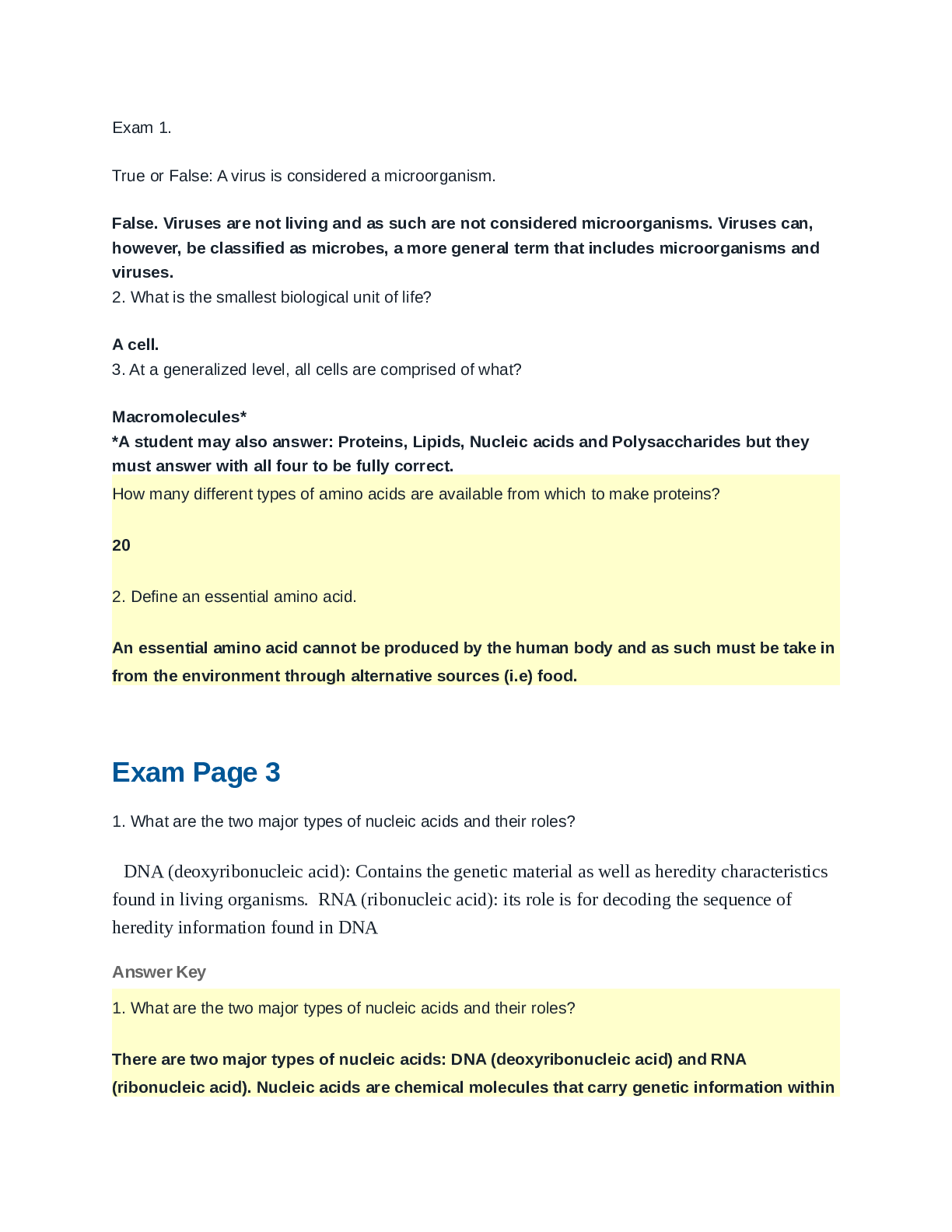*NURSING > QUESTIONS & ANSWERS > Microbiology (BIO 171) - Exam (All)
True or False: A virus is considered a microorganism. 2. What is the smallest biological unit of life? 3. At a generalized level, all cells are comprised of what? 2. Define an essential am ... ino acid. An essential amino acid cannot be produced by the human body and as such must be take in from the environment through alternative sources (i.e) food. Exam Page 3 1. What are the two major types of nucleic acids and their roles? Answer Key 1. What are the two major types of nucleic acids and their roles? Exam Page 4 Answer Key 1. Complete the following RNA strand and indicate how many bonds are formed for each complementary pair: 3’ GGUCAUCG 5’ 5’ CC AGC 3’ 3’ GGUCAUCG 5’ 5’ CCAGUAGC 3’ Exam Page 5 Answer Key 1. The plasma membrane (select all that are true): A. Only restricts movement of materials into the cell B. Is often a bilayer comprised of lipids C. Cannot prevent essential nutrients from escaping D. Contains hydrophobic tails pointing inward 2. Carbon, Hydrogen and Oxygen atoms come together to form what primary macromolecule? Give an example. Exam Page 6 Answer Key 1. True of False: Eukaryotic cells do not have a nucleus 2. True or False: Prokaryotic cells can be subdivided into Bacteria and Archaea. 3. Describe the 4 basic bacterial morphologies. 4. True or False: Archaea, a eukaryotic class of microorganisms, are capable of surviving harsh environments. Exam Page 7 Answer Key 1. Which of the following microorganisms are considered to be Eukarya? Select all that apply. A. Animalia B. Plantae C. Fungi D. Protista 2. True of False: All multicellular microorganisms classified as Animalia are heterotropic. 3. Microorganisms classified as Plantae obtain most of their energy by converting _____ energy into _______ energy. Exam Page 8 Answer Key 1. A defining characteristic of fungi is the presence of chitin in the cell walls. Which of following also contain chitin? Select all that apply. A. Mushrooms B. Bacteria C. Yeast D. Molds 2. True or False: A defining characteristic of Protista is the inability of colonies to form tissue layers. Exam Page 9 Answer Key 1. Cell walls are found in which of the following (select all that apply): A. Plants B. Fungi C. Bacteria D. Mammalian cells E. Algae 2. The function of the ribosome is (select all that apply): A. Lipid synthesis B. Protein synthesis C. To produce energy (ATP) D. Protein modification and distribution E. Waste disposal via hydrolytic enzymes [Show More]
Last updated: 3 years ago
Preview 1 out of 34 pages

Buy this document to get the full access instantly
Instant Download Access after purchase
Buy NowInstant download
We Accept:

Can't find what you want? Try our AI powered Search
Connected school, study & course
About the document
Uploaded On
Jul 26, 2022
Number of pages
34
Written in
All
This document has been written for:
Uploaded
Jul 26, 2022
Downloads
0
Views
74
Scholarfriends.com Online Platform by Browsegrades Inc. 651N South Broad St, Middletown DE. United States.
We're available through e-mail, Twitter, Facebook, and live chat.
FAQ
Questions? Leave a message!
Copyright © Scholarfriends · High quality services·